
 Somewhat Recommended ** The world premiere of Isaac Gomez’s drama “The Leopard Play, or sad songs for lost boys” is all-male production, with great acting, directing, singing, and dancing that, sadly, cannot compensate for a weak script.
Somewhat Recommended ** The world premiere of Isaac Gomez’s drama “The Leopard Play, or sad songs for lost boys” is all-male production, with great acting, directing, singing, and dancing that, sadly, cannot compensate for a weak script.
Racy, raunchy, raucous, and raw, this is a saga about a Mexican-American man about thirty years old who has been raised Catholic but is now interested in the Tarot and spirituality. He asks about the meaning of sin and wonders whether there is an afterlife or a bottomless pit of nothingness after death. He is nameless and is referred to only as Son (Brandon Rivera). The context is an interlude of ten days when Son travels from Chicago back to his parents’ home in El Paso, Texas, for a memorial service commemorating the untimely death of his Uncle Max (Dennis Garcia) ten years prior.
The main problem is that the play doesn’t know what it wants to be.
Is it a murder mystery? Son wants to understand the circumstances behind his uncle’s death in order to mourn for him properly. We learn (as if we hadn’t figured it out already) that Max did not die from a heart attack. Son’s father and his uncles want to keep a large family secret from Son and his little brother. Son wants to unravel the mystery behind their silence.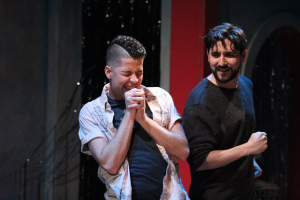
Is it meant as an affirmation or promotion of gay sex? Is the show’s purpose to make such behavior appear as natural, normal, and accepted—or serve as a way to point up the naked reality of gayness, through interaction and romantic interludes with the character Boy (Alec Coles)?
Is it pornography, pure and simple, meant to titillate some and to test the bounds of what can be performed on a Chicago stage—with all the rest being window dressing? Is it simply a public outing of private gay behavior?
Or is there a deeper meaning behind it all? The implicit question that Son asks is whether it more sinful to be gay or to be involved in the peddling and transporting of illegal drugs? Obviously, Son (presumably the voice of the playwright) has the answer to this, which is largely what the performance is about.
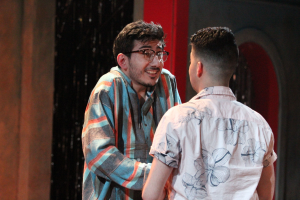 Son’s father Leopard (Victor Maraña) is a devout Catholic originally from Mexico who speaks with a heavy accent. He says he loves his son unconditionally and yet doesn’t approve of the fact his son is gay. As part of his culture, he is dedicated to his family and believes in doing his duty, namely, to provide a good income to support his wife and children. Yet Leopard and four brothers Oscar, Rodent, Taz (short for Tasmanian Devil), and Max (played by Eduardo Curley-Carrillo, Sebastian Arboleda, Juan Muñoz, and Dennis Garcia) have previously been involved in the illegal drug trade. Dad says to his son that he and his brothers had once formed a team, which they once called the Rocketmen, after Elton John’s song “Rocketman.”
Son’s father Leopard (Victor Maraña) is a devout Catholic originally from Mexico who speaks with a heavy accent. He says he loves his son unconditionally and yet doesn’t approve of the fact his son is gay. As part of his culture, he is dedicated to his family and believes in doing his duty, namely, to provide a good income to support his wife and children. Yet Leopard and four brothers Oscar, Rodent, Taz (short for Tasmanian Devil), and Max (played by Eduardo Curley-Carrillo, Sebastian Arboleda, Juan Muñoz, and Dennis Garcia) have previously been involved in the illegal drug trade. Dad says to his son that he and his brothers had once formed a team, which they once called the Rocketmen, after Elton John’s song “Rocketman.”
“I’m not the man they think I am at home.
Oh, no; oh, no; I’m a Rocketman.”
Playwright Gomez is fascinated by the double meaning of the word “uncle” as a euphemism for homosexual. Son’s four uncles are familial but also, with the (possible) exception of Oscar, all gay men. If the double entendre on the word “uncle” isn’t made clear within the context of the show, it becomes evident when reading the playbill: None of the uncles are named as such. The only time when the audience clearly catches a given name (rather than a nickname) is when we are told during the course of the play that the eldest brother Max was originally known as Jesús. This turns out to be an important detail.
Spoiler alert: Ten years ago, when Oscar becomes responsible for drugs stolen from his shipment, he doesn’t know what to do. He is certain he will be killed by members of the illicit drug cartel. But Oscar has a wife and kids to raise. So Max makes a tremendous sacrifice: He claims to be Oscar, and the drug cartel kills him instead. His violent death serves to save Oscar and the rest of the family from harm. As Christianity would have it—and as the audience figures out—Jesus died for their sins. He was their savior.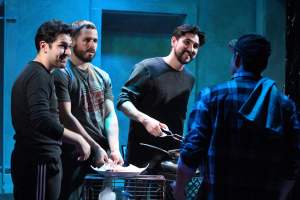
The wiser (and straight) older brother (Arash Fakhrabadi) knows when to keep his mouth shut about the dealings of their father and uncles. The younger brother (Juan Muñoz) is off at college, so he’s not a part of this family secret. Note that a common occurrence in a so-called “alcoholic family structure” is where blame is spread around among all family members so as to paper over the failings and misdeeds of any one individual. The one person who wants to reveal the truth of the whole situation is made out to be the bad guy. Needless to say, Son’s curiosity only gets him into trouble with the family.
Micah Figueroa does a great job as violence and intimacy director in making scenes dealing with sex, fighting, and other forms of physical contact realistic. Yet how necessary is it to show the evolution of a “sweet boy” into a monster, so that he can unleash his excruciating agony during a blatant and rough sex act? How explicit must this be in order to make the playwright’s point, assuming that there is even a point to make?
That said, watching the strapping young men in their burlesque numbers is quite entertaining. All their singing and dancing and crude gestures represent the liveliest, if not the most humorous, part of the performance. Credit must go to Breon Arzell for awesome choreography and to Uriel Gómez for clever costumes. These scenes are enhanced by excellent lighting by Alexander Ridgers and fantastic sound design by Thomas Dixon, who do a marvelous job throughout the entire show. Also notable is the quality of Laura Alcalá Baker’s directing.
Unfortunately, there are far too many deficiencies in the underlying script to save things. To put it bluntly, laying bare the emotions of a promiscuous young protagonist and showcasing his vulnerabilities before an audience does not make a worthy production in and of itself. It is interesting to see Son wrestle with poignant questions and deal with battered family members who thrive on alcohol and live on drugs. But Gomez’s framing of the larger story gets lost in insipid dialogue and in too many distractions from the main theme, especially with the injection of so much graphic sex and sex-tinged conversation. Due to shifting timelines and false climaxes (dramatic and sexual), the play loses its focus over time and the characters lose their force. More effort should have been made on the structure of the script as an entirety—and less on the hurt, the porn, and the pain.
“The Leopard Play” is playing at the Steep Theatre, 1115 W. Berwyn Avenue, Chicago, through February 29, 2020.
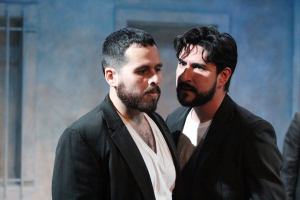 General admission tickets: $27
General admission tickets: $27
Reserved seat tickets: $39
Access tickets: $10 (Steep’s universal discount for students, artists, et al.
Performance schedule:
Thursdays, Fridays, and Saturdays – 8:00 p.m.
Sunday matinees – 3:00 p.m.
Accessible performances:
Audio description, Saturday February 15 – 8:00 p.m.
Open captioning, Saturday, February 22 – 8:00 p.m. and Sunday, February 23 – 3:00 p.m.
Chicago Theatre Week: February 13 – 23
(Discounted tickets to some of the city’s hottest shows and top theatre)
To purchase tickets, contact 773-649-3186, or online at www.steeptheatre.com.
For general information, email info@steeptheatre.com, call 773-649-3186, or go to www.steeptheatre.com.
To see what others are saying, visit www.theatreinchicago.com, go to Review Round-Up and click at “The Leoprad Play”.


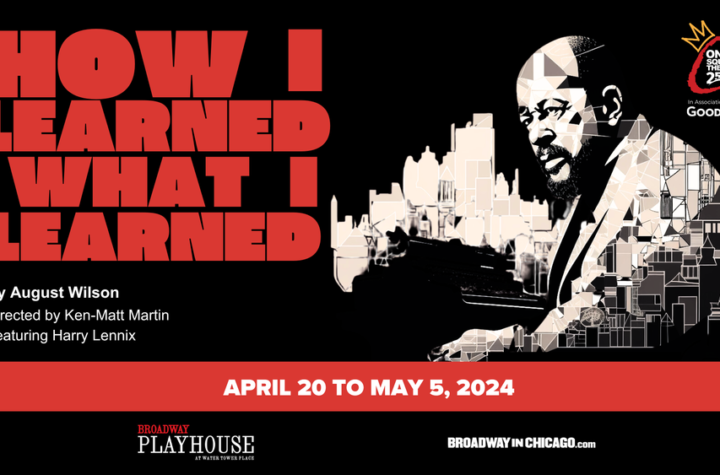

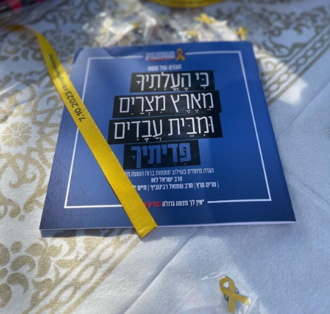

More Stories
“How I Learned What I Learned” reviewed by Julia W. Rath
“How to Know the Wild Flowers: A Map” reviewed by Julia W. Rath
“Baby: the Musical”